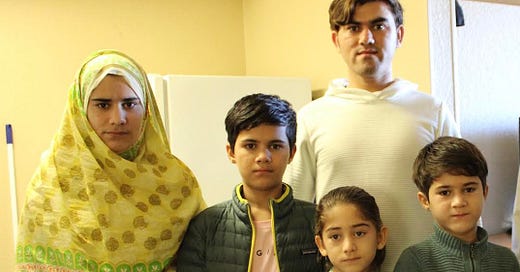The Mohameds are among hundreds of Afghans waiting to start their lives in Atlanta.
Families are living in hotels for weeks, as advocates struggle to find affordable housing in metro area
Next to an I-85 off-ramp in metro Atlanta, there are at least 12 Afghan families. They were part of the mass evacuation of their country in August. They made it to America safely and successfully, but their journey has, at least for now, stalled.
Yusuf Mohamed (whose name has been changed because of his concerns for the safety of his family) and his ten children are one of those families. In August, they left their home in Kunar province, and boarded a plane leaving Afghanistan for Qatar. From there, they were transferred to a U.S. military base in Germany, where they stayed for 14 days, and then, got on another plane and flew to yet another military base - this time in Virginia. They lived there for two months before arriving in Atlanta in October. For the past 40 days, they’ve been living in a hotel, along with at least 11 other Afghan families.
The hotel is, of course, a temporary arrangement. But how temporary, it’s hard to know. Resettlement agencies have been struggling to find affordable housing, fast enough, for many of the large families who have arrived in Georgia over the last two months (“I need 65 or 70 homes right now,” said John Arnold of The Welcome Co-op). As a result, Afghans who have crossed oceans, boarded multiple planes, and lived in makeshift situations for months, find themselves at their destination, but still unable to start their lives.
Yusuf and his family are grateful to be in the U.S. and to be safe. His worries have shifted from safety to the challenges of navigating life in a new country. In Afghanistan, he was a plumber, working at a U.S. military base for 18 years and making enough of a salary to support his family. Now that he’s here, he has to learn English, get a job, obtain a driver’s license, find housing, and enroll his children in school. When he describes his situation in Pashto, his face reddens and tears fill his eyes. His eldest son, Ikram, translates, “We have a big family. We don’t have money...home costs are very high.”
The family's daily routine is carried out against the background hum of cars zooming down 16 lanes of highway. They spend most of their time inside the walls of their two hotel rooms watching TV, reading the Quran, or preparing food in the kitchenette.
The men and boys sometimes take walks around the parking lot with the other Afghans living in the hotel. Occasionally, they’ll cross the road to buy food from the closest grocery store in walking distance (“we eat vegetables because they don’t sell halal meat there” said Ikram). Without English they have no way of using Google Maps to help them navigate their way to the halal butcher, which is just an 8 minute drive away. And even if they did, they have no car.

The only contact Ikram says they have with the world outside the hotel compound is with their case worker, who he said gave the family a card for buying groceries and took photos of their documents. Other than that, the case worker has been difficult to get in touch with. “He’s busy,” said Ikram.
Ikram and his siblings are eager to get their lives started here, but it’s hard when they’re struggling to communicate. “We want to learn English,” said Ikram.
Mudassir, Ikram’s 9 year old brother, starts counting out loud from 1 to 12 in English, when he hears his older brother count their number of siblings. Ikram then asks him to say the ABC's. Mudassir recites it carefully, slowly. His father beams. "He learned it in this country," says Ikram.
“Education, our only hope."
Like so many of the Afghans who have arrived here in the last two months, they’re not sure when their situation will change. In the coming months, even more people could find themselves in this same predicament, as hundreds more Afghans are expected to arrive in the Atlanta area in the winter months.
And yet, the challenges ahead don’t seem to have impacted their appreciation of their new home - "We love America,” said Ikram.







